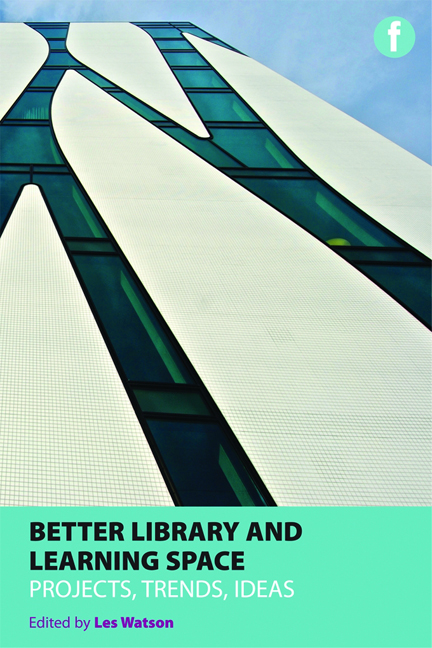Book contents
- Frontmatter
- Contents
- Case studies
- Acknowledgements
- Contributors
- Introduction – about this book
- PART 1 PROJECTS AND TRENDS
- PART 2 TRENDS AND IDEAS
- PART 3 IDEAS AND FUTURES
- Introduction
- 11 Beyond space: access is all – or is it?
- 12 Thinking inside the box
- 13 Nothing has changed/everything has changed – the enduring aspects of learning
- 14 Books, nooks and MOOCs
- 15 The researcher's view: context is critical
- 16 Libraries in the network society: evolution, revolution, extinction?
- 17 Powered by learning: developing models of provision to meet the expectations of new generations of students
- 18 The library has left the building
- 19 Beyond analogue: the learning studio as media-age library
- 20 3D libraries for 3D smarting
- 21 Learning landscapes, the library and the University of Lincoln: efficiency, effectiveness, expression and experimentation
- 22 Viral design: learners building better environments together
- 23 The interior designer's view
- 24 Furniture fit for the future – a brief exploration of library and learning furniture today and for the coming generation
- 25 Conclusions
- Index
16 - Libraries in the network society: evolution, revolution, extinction?
from PART 3 - IDEAS AND FUTURES
Published online by Cambridge University Press: 08 June 2018
- Frontmatter
- Contents
- Case studies
- Acknowledgements
- Contributors
- Introduction – about this book
- PART 1 PROJECTS AND TRENDS
- PART 2 TRENDS AND IDEAS
- PART 3 IDEAS AND FUTURES
- Introduction
- 11 Beyond space: access is all – or is it?
- 12 Thinking inside the box
- 13 Nothing has changed/everything has changed – the enduring aspects of learning
- 14 Books, nooks and MOOCs
- 15 The researcher's view: context is critical
- 16 Libraries in the network society: evolution, revolution, extinction?
- 17 Powered by learning: developing models of provision to meet the expectations of new generations of students
- 18 The library has left the building
- 19 Beyond analogue: the learning studio as media-age library
- 20 3D libraries for 3D smarting
- 21 Learning landscapes, the library and the University of Lincoln: efficiency, effectiveness, expression and experimentation
- 22 Viral design: learners building better environments together
- 23 The interior designer's view
- 24 Furniture fit for the future – a brief exploration of library and learning furniture today and for the coming generation
- 25 Conclusions
- Index
Summary
The Internet has become a vital part of our lives and our society.
Dutton and Blank (2011, 8)Welcome to the network society
The Oxford Internet Institute's biennial study (Dutton and Blank, 2011) reminds us just how important the internet now is to every aspect of life. Three-quarters of the UK population are regular internet users (ONS, 2012), who invariably use broadband, and the web is now an essential information source in support of the daily routine. Most searched-for topics include travel information (86% of users), local information (86%), news (79%) and health information (71%). The web is an online shopping mall (86%) and bank (60%), a place of communication and interaction (e-mail 96%, social networking 60%) and entertainment (music 61%, games 51%) (Dutton and Blank, 2011, Chapter 3). Dutton and Blank (2011) report that almost half of internet users expect 24/7 access from multiple platforms, and these next generation users are of all ages.
Attaching simple labels to something as complex and heterodox as a whole society risks oversimplification, but they may be helpful to understanding general patterns of change. The agrarian, industrial, postindustrial and information society all highlight significant change both in social behaviours, values and expectations and in the conventions and structures that sustain a society. In his seminal study The Rise of the Network Society, Manuel Castells (2010) argues that the defining feature of the network society is that digital networks become ‘the predominant organizational form of every domain of human activity’, and it is within Castells’ definition that this chapter considers the future for libraries as agents of learning. The evidence within the Oxford Internet Survey certainly demonstrates significant behavioural changes. Furthermore, in the private sector radical structural change has already taken place in sectors such as the recorded music industry and retailing (Naughton, 2012). Traditional industries have frequently struggled to respond to the speed of market evolution and to competition from start-up entrepreneurs and innovators. Google and Facebook grew from student ideas to become global phenomena, while it took an innovative organization to see what the recorded music industry could not see, that the chemistry of Napster and the MP3 player was not a threat, but a catalyst for the marketchanging iTunes service. The net result is an ever-increasing rate of change with greater competition, rapid innovation and unstoppable market demand for new platforms and services.
- Type
- Chapter
- Information
- Better Library and Learning SpaceProjects, trends and ideas, pp. 193 - 200Publisher: FacetPrint publication year: 2013



